It has been 16 years since Anthony Daly made his first appearance on the Sunday Game highlights show, but the biggest surprise came earlier that week.
"I couldn’t believe it when I first heard I was to be in the studios at 1pm and not going on air until 9.30pm. I was thinking, 'what the f*** will we be doing all day?'"
Last night, he came on screen at 10.40pm, 14 hours after leaving home for a 20-minute segment alongside Liam Sheedy.
"People don’t get the work involved," he says.
For the first Sunday Game of the championship, Sean Cavanagh and Paul Flynn are on football duties, while Jacqui Hurley makes her first appearance at the helm since becoming the permanent anchor.
A programme that covers 11 matches – nine football and two hurling – is more manageable than the weekends where across both codes up to 25 matches could be down for decision.
Yet within that, logistical, financial and resource considerations come into play.
"The split season means clashing with other sports for resources," says programme editor Wes Liddy, the man tasked with keeping all the plates spinning.
"We’re battling for cameramen, for directors, sub-editors etc."
The team gathers from morning time, with sub-editors likely to be first in to start into the action from the previous day.
The New York-Leitrim game was down as a report in the running order, but the unexpected result means not only has it been bumped up to a match edit – more than double the length of a report - it will now open the show.
The running order can change throughout the day depending on results, and, similar to Match of the Day where a team’s supporters can feel short-changed, the rationale remains the same.
"The biggest story always leads," Liddy says.
Flynn and Cavanagh sit down to rewatch the Gaelic Park giant-killing, identifying Leitrim’s profligacy in front of goal as well as the contribution of New York’s homegrown players.
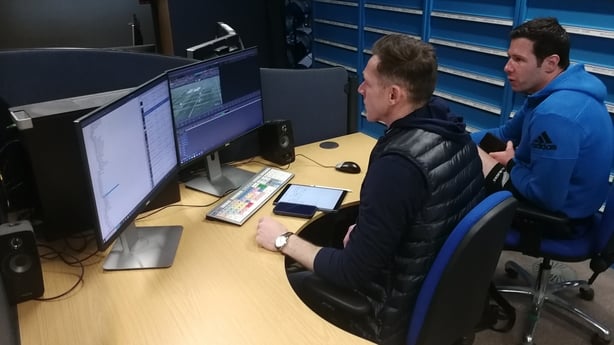
One New York player in particular, Shane Carthy, is very familiar to Flynn from his time in the Dublin set-up.
It marks Flynn’s first championship show, and Daly feels it’s unlikely to be as chastening an experience as his own debut back in July 2007
Somehow the stars aligned that he was on duty to discuss 'Semplegate’ where Cork and Clare players became embroiled in the tunnel and continued the jostling on the pitch.
Presenter Pat Spillane was seeking Daly’s condemnation, but only 12 months out of the Banner hotseat, his response wasn’t convincing to himself or the viewers.
"It was the greatest lesson I ever got, to be myself."
"My brother rang me after and said ‘if you’re not going to be what you are like down in the pub after a Clare or Clarecastle match, shooting the breeze with the lads, forget about it'.
"It was the greatest lesson I ever got, to be myself."
At another desk, reporter Cathal Mullaney is watching a live feed of the Munster football clash of Tipperary and Waterford with sub-editor Ray McMenamin.
The pair jot down every score and incident on a shot list, an essential tool when clipping up the required footage later.
Around four key moments per half is the requirement, and while the editing of the footage is taking place, requests are sent to the graphics team for the required on-screen imagery such as county crests, score board updates and full-time results.
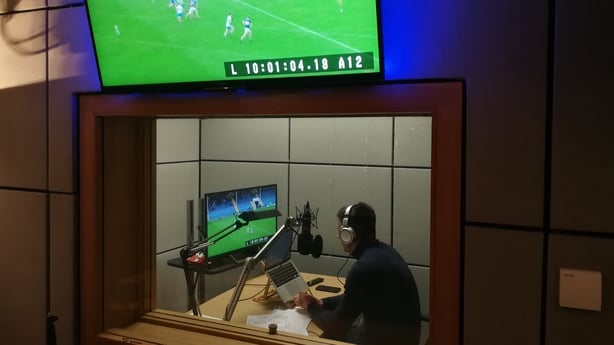
Next up is the dubbing studio where the commentary must align with the selected shots. Once everything has been given the green light, the 90-second report is good to go.
One of Liddy’s guiding principles is prioritising match action over everything else.
Having taken over the flagship programme in 2019, subtle changes have been on-going. Reducing time on scene-sets, not throwing back to studio after each game and only using managerial soundbites if there is something that can add value.
"We have geared everything into getting the maximum information into the minimum amount of time, in order to create more time for more games."
WATCH HIGHLIGHTS OF ALL THE WEEKEND'S GAMES
Despite the advances in technology, the days of waiting at base for the match footage to be delivered are not fully redundant.
Live U technology allows live footage to feed back into RTÉ to make match edits, but that simply isn’t feasible for multiple games on the same day.
Liam Sheedy and Anthony Daly are watching the hurling league final unfold with an eye to talking points that evening, notes being scribbled down while assessing the emergence of patterns within the game.
At half-time, with Limerick beginning to pull away, Sheedy says there could be a piece in the Treaty full-forward line, the movement and interplay between Aaron Gillane, Seamus Flanagan and Peter Casey.
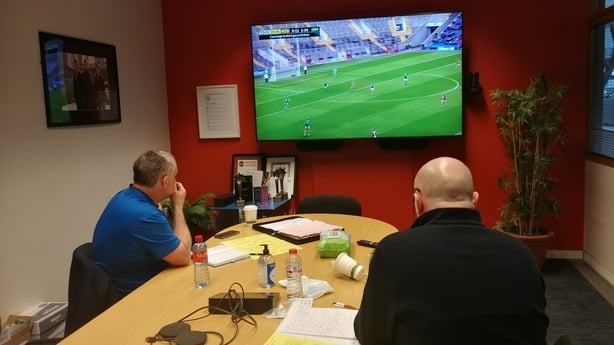
"There’s definitely a piece on the inside line," the former Tipperary manager insists when Flanagan points in the 43rd minute to push Limerick’s advantage out to eight points.
By the time referee Paud Dwyer brings proceedings to an end on Leeside, the pair tease out what other talking points are in the mix; they settle on the inside line (Sheedy) and how Limerick build up from the back regardless of the opposition (Daly).
As the pair set off to get the footage they require with sub-editors, Flynn and Cavanagh are watching the Connacht clash of Roscommon and Mayo alongside Jacqui Hurley.
Along with Liddy, they are taking in a Rossies victory while going over areas for discussion in the other games as results come in.
The busy nature of the day is nothing new for Hurley. Having cut her teeth initially as a sub-editor on the Sunday Game, her experience in presenting some hectic Sunday Sport programmes on RTÉ Radio 1 is a solid foundation for the role ahead.
"I’m glad this isn’t my first rodeo. Some Sunday shows on radio you could be flying by the seat of your pants. I’m fine with the chaos."
"I always found The Sunday Game a kinder version of analysis."
Cavanagh was delighted to join the RTÉ team after Tyrone’s 2017 All-Ireland semi-final defeat to Dublin – a game where Flynn kicked 0-03 – and from his time as a player, always felt the programme was a decent appraisal of performance.
"I saw it as something that was fair and measured. It didn’t go into the ridiculous scrutiny of the papers, like being ranked as player out of 10, which could get inside your head.
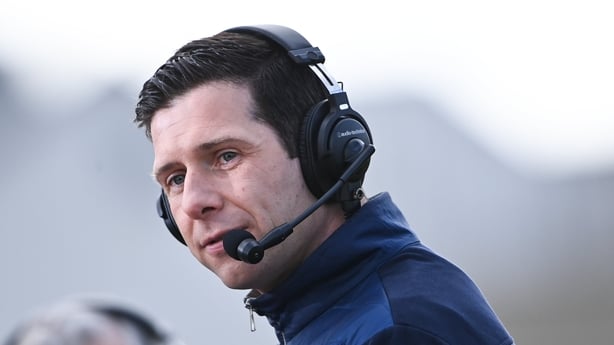
"I always found it a kinder version of analysis of the game. You do get called out for bad performances, but – aside from my mate Joe Brolly – I found it was less direct on players.
"As a pundit it is something I try to live by. I try to veer away from anything that will be harmful for an individual’s life, but at the same time viewers want that objective analysis."
Brevity and starting with your key points has been a work in progress – "I struggled a little with my timing" – while a resilient streak so evident on the pitch during his 16 years with Tyrone has proven useful off it too.
He thinks back to the "up here in the UK" comment made during an RTÉ GAA podcast when discussing the impact of the Covid lockdown on GAA clubs, referring to the two separate jurisdictions on the island.
"I got slaughtered by my own people for making that comment. In my own head it was very innocent, I was just comparing Covid response policy."
The phone was buzzing too in 2019 when he suggested the time had possibly arrived for Tyrone and Mickey Harte to part ways.
"It comes and goes very quickly. If you’re not annoying people at times, you’re probably not doing your job properly. You are there to offer an opinion."
By 8pm rehearsals and studio preparations are in full swing. A live feed to chat to New York’s Shane Carthy is being set-up as Flynn and Cavanagh take their positions.
Up in the studio gallery, Liddy takes his place among the production team. Hurley goes through her final piece to camera while each of the segments for the show is carefully laid out, director Dave Berry calling the shots between the sound room and studio floor.
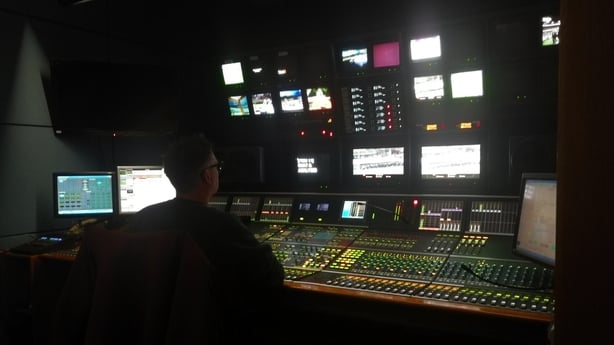
"It can be stressful, but you get into a rhythm with it," Liddy says. "The things that go on air at 10 are rarely ready to go when the show starts.
"You have to make sure you don’t get so consumed by those logistical issues, that you’re still able to filter the editorial side of things."
5, 4, 3, 2, 1…"Good evening and welcome to The Sunday Game..."
The new studio layout and graphics get a first airing, while Flynn dissects the Roscommon approach with the touchscreen at hand.
An audio issue with the commentary from Gaelic Park is an unfortunate start, but the ‘live’ link to Carthy from Upper East Side, New York, gives the show a more interactive feel.
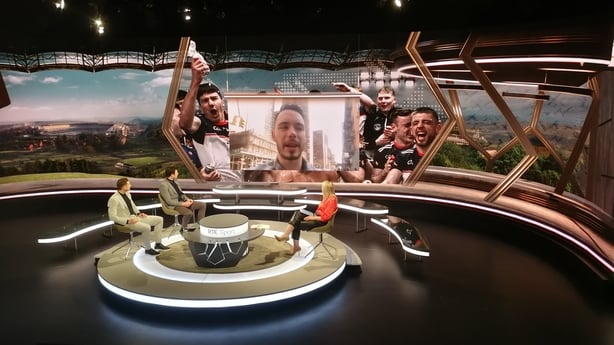
The hour whizzes by before the programme switches to hurling.
Limerick’s defeat of Kilkenny is the main course, and runs for over 16 minutes with match highlights, two pieces of match analysis, a general chat and a pre-recorded interview by Marty Morrissey with John Kiely.
"They've assembled the best panel they’ve ever had."
— The Sunday Game (@TheSundayGame) April 9, 2023
Ominous to hear for the challengers, but Liam Sheedy believes that Limerick are stronger than ever.
📺 Watch: https://t.co/ZfZ9mA9XTY
💻Watch highlights of the weekend's GAA action here - https://t.co/YWlZU2XR7w pic.twitter.com/qB57BwXXYC
After that the Joe McDonagh is covered and the Tipperary-Wexford challenge game that was abandoned due to a racist abuse suffered by Lee Chin.
"The association have to take a hard look at this," Sheedy says. "There is no place in the GAA for this. Lee Chin is on one the greatest ambassadors we have in the game. For him to go through that in a match is not acceptable."
Before we know it, after 75 minutes and 11 games covered, the opening show of the season is complete.
With months in between confirmation of getting the role to the start of the new season, Hurley is relieved to finally get started.
The positivity and kindness she experienced after landing the gig was unexpected, but she’s aware of the criticism the show attracts, largely down to the fact the public feel a level of ownership that is hard to find anywhere else.
"I guess that’s why there is so much chat out there about what it should be.
"We know there are difficulties with the Sunday Game. You are going to get things wrong and people are going to lambast you for it.
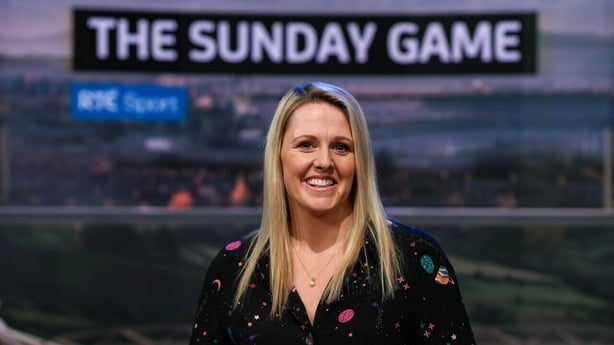
"We are not going to get all of that right immediately, but we can make small tweaks as we go and listen as much as possible."
Liddy readily agrees.
"You have to be open to doing things better, but equally you need to have a good filter."
The panel and crew slowly disperse from studio. Cavanagh faces into a longer journey home than Dubliner Flynn, while Daly prefers to stay the night before hitting the road in the morning to open up the pub.
It’s Monday morning before the lights are shut off, with plans already well underway for the coming weekend.
The Sunday Game, up and running for 2023.


